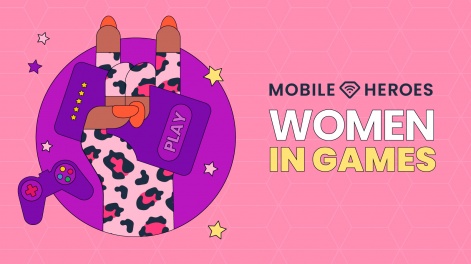Jam City’s Radostina Zhekova and Winnie Wen on UA creativity and the rise of fem | Pocket Gamer.biz

Mobile advertising company Liftoff has invited inspirational women working on some of the biggest mobile games to discuss their achievements, challenges and future aspirations. This time the focus is on Radostina Zhekova and Winnie Wen, who head up the user acquisition (UA) team at Jam City.
You can make the best mobile game in the world, but it doesn’t matter if nobody plays it. This is why most game development studios employ dedicated teams specialising in user acquisition who have all sorts of creative ideas up their sleeves to bring in new players. That’s very much the case for Jam City, the developer behind hits such as Harry Potter: Hogwarts Mystery, Cookie Jam, and Disney Emoji Blitz.
One of the most senior members of their user acquisition team is VP Winnie Wen, who has been with the company for over five years, focusing on all aspects of paid growth. Before joining Jam City, Wen spent several years at WB Games managing the overall budget, strategy, and direction of paid user acquisition for titles such as DC Legends, Mortal Kombat X, and Injustice: Gods Among Us.
Joining Wen on the UA team is Senior Manager Radostina Zhekova, whose job involves identifying different growth strategies. She spends a lot of her time communicating with different creative teams to ensure that their marketing plans work toward the same end goal.
The pair have more in common than their shared passion and knowledge of user acquisition – they both transitioned into mobile game marketing with little to no experience in the sector.

Shifting careers into mobile marketing
When Zhekova completed her bachelor’s degree in marketing around 10 years ago, she never imagined a future in mobile marketing. Around that time, mobile marketing was in its infancy, with the Apple App Store still finding its feet after its launch in 2008. It’s hard to believe it had a mere 500 apps back then compared to today’s 2.84-plus million. And while she’s partial to the odd game of Tuscany Villa, Zhekova has never thought of herself as a gamer.
That changed when she became an account manager at an ad tech agency in 2016: “The whole thing happened by accident. I was looking for a new job, and ad tech seemed interesting—the team was really nice, so I went for it. The role involved working with a lot of different gaming companies, and that’s how I became interested in the industry.
“I had a hard time making the jump to games marketing. It sounds like it all happened very easily, but it took a lot of effort before I was given an opportunity. One of the biggest assumptions I had to overcome was that you need to be a ‘big gamer’ to do a good job. I don’t think that’s the case—you can be a casual gamer and still have plenty to bring to the table if you’ve got the necessary skills.”
Like Zhekova, Wen initially faced an uphill battle getting into gaming. She spent most of her initial career building up marketing experience in corporate finance and healthcare and began hunting for something new after realising she wasn’t passionate about those industries. She decided to try mobile marketing after noticing a number of vacancies cropping up on LinkedIn, but Wen’s lack of experience meant she faced a lot of rejection.
“It was difficult to get my foot in the door as I was doing traditional direct mail marketing,” she explains. “Most of the mobile opportunities were looking for someone with relevant experience in mobile or web marketing. I was almost ready to give up after getting only a few responses, all rejections, but I lucked out as a gaming startup decided to take a chance on me.
“It hasn’t been easy. There were a lot of moments early on in my career where I had to speak up and make myself heard—I’ve also had to advocate for myself and demonstrate the value I can bring to the team. However, I’m also lucky to have worked with a few managers who had my best interests at heart and invested time to help me grow.”
The rewards and challenges of user acquisition
Zhekova and Wen still encounter many challenges in their careers. Perhaps the biggest obstacle they face today is the rising user acquisition costs. Much of that can be attributed to the impact of Apple’s ATT, which has significantly reduced the deterministic data available to mobile marketers for their ad campaigns. The mobile space is also bigger than ever, with millions of apps competing for attention.
That’s made achieving results far more challenging, particularly when working with a tightened budget. The demands placed on those working in user acquisition are immense.
During the pandemic, the mobile market (and gaming in general) saw exponential growth that has since tapered off as people’s lives returned to normal. Zhekova says the aim now is to ‘maintain a high level of performance at a consistent scale,’ but it can be hard to sell that as success when people have seen how graphs used to shoot upwards.
“With everything that’s changed in the market, you need to be well-versed to work in user acquisition now,” Zhekova explains. “Those entering the industry today will face tougher requirements for roles than they used to because expectations are much higher. Having technical knowledge and analytical skills, such as the ability to manage and handle data, or communicate with a database through structured query language (SQL), is a real bonus.”
Wen adds that the heightened expectations mean it’s more important than ever to properly delegate work: “Managing a big portfolio is no easy feat, as there are many areas that require our attention and oversight,” she says. “One of the more challenging parts of our jobs is letting go and entrusting others to take on various projects and initiatives. I know my team is fully capable and will crush it, but it’s easy to stretch yourself too thin and try to tackle everything firsthand. That just simply isn’t feasible in today’s environment.”
While there are plenty of challenges you can encounter working in mobile marketing, there are just as many rewards. Creativity isn’t the first thing that comes to mind when talking about user acquisition, but the pair have found endless opportunities to experiment within their roles – especially where numbers are concerned.
“Leaving the traditional marketing space behind was one of the best decisions I’ve ever made, as there are no rules in mobile marketing,” Wen says. “Coming from a corporate marketing space, it was a breath of fresh air to have the freedom to test different creatives and copy. Mobile marketing encourages creativity and originality, and adding innovative technology to the equation makes the industry one of the fastest growing of our generation.”
Zhekova agrees. “Creativity is very important for my job, even though it might seem like this isn’t a very creative position. Trying to find innovative ways of attracting more users is key, but the mistakes made along the way are just as important. It’s often only when you break something that you understand how it works, and from that knowledge, you understand how to hack it and ultimately find new growth opportunities.”
The paradox between female gamers and developers
One of the most interesting takeaways from our discussion with Zhekova and Wen is the gender contrast in the mobile gaming industry when it comes to gamers and developers. The International Game Developers Association (IGDA) found that 71 percent of game devs globally are men, while just 24 percent are women, and 3% are non-binary. The situation is largely similar regarding people who play games, with around 36 percent of gamers identifying themselves as women across all devices, according to a recent survey by Ampere Analysis.
However, when you look at mobile games specifically, the situation is completely different—women make up the majority of the market at 66 percent. Similarly, a new study commissioned by GameHouse found that 74 percent of women of all age groups play mobile games daily.
“Historically, the tech and gaming industry have always skewed male-heavy, and that’s not likely to change anytime soon,” Wen says. “For women to be successful and level up in gaming, it takes an awesome manager, which isn’t common, although I have started to see an increase in women in senior positions in recent years—such as in product, data, and other leadership roles.”
Zhekova adds: “If you ask mobile game developers who their target audience is, they’ll probably tell you something like a 25 to 35-year-old-plus female – especially if it’s a casual puzzle game. You have this paradox of a male-dominated industry making products that are predominantly targeted at women.
“I hope that in the future, more game companies realise that women are actually a really big part of gaming and their user bases and will be more proactive about getting them involved in both the creation and marketing of their games.”
